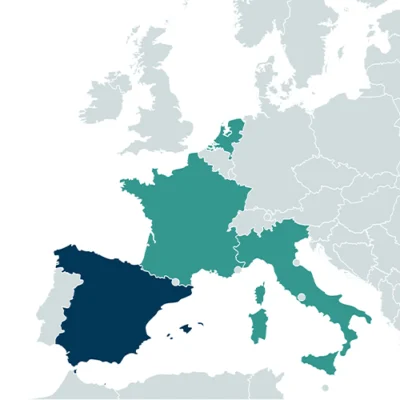River Conviviality: Advancing socio-environmentally just river restoration through nature-based solutions
Call
Duration
01/04/2025 – 31/03/2028
Total grant
Approx. 1 mil. €
More information
Marta García-Mollá, mgarmo@esp.upv.es
Partners of the project
- Valencian Centre for Irrigation Studies, Polytechnic University of Valencia, Valencia, Spain
- Department of Geography, University of Girona, Girona, Spain
- Water Management, Actors, Territories, Montpellier, France
- Environmental Sciences Group, Wageningen University and Research, Wageningen, the Netherlands
- Department of Environment, Land and Infrastructure Engineering, Polytechnics of Torino, Torino, Italy
- Land, Environment, Agriculture and Forestry, University of Padova, Padova, Italy
- Environment City Society, Lyon Saint-Etienne pole, Lyon, France

Context
Over the past two centuries, most of the world’s rivers have been heavily transformed to meet various human needs. In response, river restoration has received increased attention in policy and practice. The UN has declared the Decade on Ecosystem Restoration, and the European Union (EU) has adopted the Biodiversity Strategy (2020) and Nature Restoration Law (2024). Despite the ambitious plans, their strategy and implementation are often challenged and frustrated by fierce social contestations. This aspect is little explored and largely overlooked in restoration literature and practice, which predominantly portrays contestations as matters of miscommunication or lack of awareness.
To support and advance more inclusive transformative socio-ecological change in the above sketched context, RiVIVE will centre around the following main research question: How can the exploration and elaboration of the notion of riverscape conviviality translate to new insights and approaches that support transformative change towards more biodiverse, inclusive and socio-environmentally just outcomes in river restoration initiatives?
Main objectives
- Theoretically explore riverscape conviviality to, analyse, engage-with, learn-from and inspire scholars, practitioners and stakeholders that work on river restoration, advancing towards more socio-environmental just initiatives and processes;
- Develop, test, and validate alternatives to prevailing mainstream approaches to river restoration based on novel methodologies for: stakeholder engagement, citizen science and impact monitoring, multi-functionality mapping, and the co-design of socio-environmentally just and robust river futures;
- Create spaces and creative inspirational materials to advance environmental justice by sharing, transferring, and disseminating project results with scholars, practitioners and civil society engaged in riverscapes restoration initiatives in Europe and beyond.
Main activities
The project will be applied transversally across seven case studies, through a combination of qualitative and quantitative methods. The concept of conviviality of river landscapes is pivotal, and will be studied to analyse, engage, learn and inspire academics, practitioners and stakeholders working in river restoration. To this end, Riparian Assemblies (RAs) will be created, as forums to produce convivial knowledge and experience. The RA will serve as spaces of encounter and “collective investigation” where knowledge, concerns and ideas about rivers, their functions, values and relations will be co-created and pooled; providing important opportunities to bridge and break down divides between ‘expert’ and ‘lay’ knowledge.